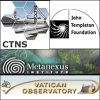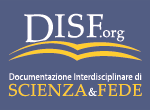Interdisciplinary Encyclopedia of Religion and Science
 The Encyclopedia, published by the Centro di Documentazione Interdisciplinare di Scienza e Fede operating at the Pontifical University of the Holy Cross in Rome, provides new, scholarly articles in the rapidly growing international field of Religion and Science (ISSN: 2037-2329). INTERS is a free online encyclopedia.
The Encyclopedia, published by the Centro di Documentazione Interdisciplinare di Scienza e Fede operating at the Pontifical University of the Holy Cross in Rome, provides new, scholarly articles in the rapidly growing international field of Religion and Science (ISSN: 2037-2329). INTERS is a free online encyclopedia.

Anthology and Documents
 To emphasize and spread relevant documents within the scientific community, this section provides key materials concerning the dialogue among science, philosophy and theology.
To emphasize and spread relevant documents within the scientific community, this section provides key materials concerning the dialogue among science, philosophy and theology.
Special Issues
 We offer here a selection of comments and documents on special issues in Religion and Science, collected for anniversaries and/or for the relevance of the topics.
We offer here a selection of comments and documents on special issues in Religion and Science, collected for anniversaries and/or for the relevance of the topics.









